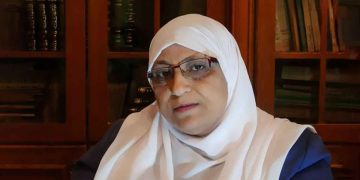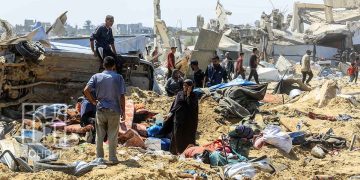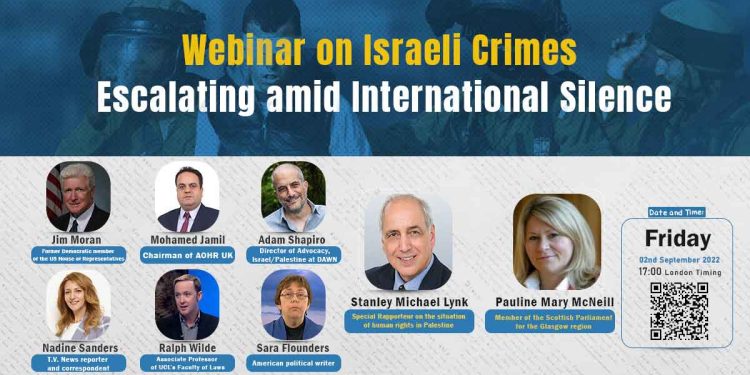The Israeli occupation’s ongoing oppression, violence and denial of human rights toward Palestinians was the topic of a webinar hosted by Arab Organisation for Human Rights in the UK (AOHR UK), which took place on Friday, 2 September.
The webinar, on “Israeli Crimes Escalating amid International Silence”, brought together academics, campaigners, political figures and others from around the world to discuss not only the continued violations of international law by Israel but also the role of the international media and world powers in granting immunity to Israel for its crimes.
In his introduction, AOHR UK’s Joe Haynes framed the discussion with reference to the way in which the international media generally ignores Israel’s treatment of Palestinians, such as in the coverage of the occupation bombing campaign on Gaza in August, which led to the deaths of 49 Palestinians including 17 children.
First to speak was Stanley Michael Lynk, the Canadian associate professor at the University of Western Ontario and former UN special rapporteur on the situation of human rights in the Occupied Palestinian Territory.
He began by noting that the death rate of Palestinians in the West Bank is now at its highest since 2016 and that at least 85 Palestinians have been killed in the West Bank so far this year.
One of these deaths, he said, was that of Palestinian-American journalist Shireen Abu Akleh, who was killed in May “almost certainly by Israeli gunfire when she was covering an Israeli military raid on the northern West Bank city of Jenin”.
He continued: “She was a Palestinian-American, and there was also another Palestinian-American who was killed, Omar Assad, a 78-year-old man who was coming back from a card game. He was blindfolded, arrested and left out in the January cold and died under those circumstances.”
Lynk added: “I want to be able to say clearly, with respect to both the West Bank and also with respect to Gaza, and particularly the 49 Palestinians who were killed last month during the brief assault by the Israeli military, that the Israeli occupation is requiring more and more violence and more coercion, including more deadly violence, in order to be able to maintain its rule.”
He went on to chart a series of examples of this heightened aggression at the hands of the occupation, including the fact that more than 600 Palestinians are currently being held in “administrative detention” – without charge – in Israeli prisons, while settlers have intensified their attacks on Palestinians and house demolitions have increased.
“This indicates to me the growing restiveness in the Occupied Palestinian Territory against the multiple abuses of the Israeli occupation,” he said. “It also indicates to me that the hold on power by the Palestinian Authority is becoming more and more shaky, as … the security relationship between Israel and the Palestinian Authority has become more and more fractured.”
Lynk spoke about how the use of live fire on unarmed civilians was strictly outlawed internationally, but that Israel was treated with impunity for its violations.
“The international community would understand the glaring examples of what is going on in the West Bank and Gaza and east Jerusalem [and] that muffled protests and meek criticisms by international diplomats are not changing the reality on the ground.
“An international community that had taken its responsibilities seriously would have drawn the necessary lessons from the many unfulfilled Security Council and General Assembly resolutions, the inordinate length of the occupation, the innumerable facts on the ground and the endless rounds of negotiations. Such an international community would take the prudent and necessary steps to collectively construct a list of effective countermeasures, which would be appropriate and proportional to circumstances to bring this occupation to an end.”
He concluded: “All of this tells us that accountability must rise to the very top of the international political agenda respecting the illegal Israeli occupation of Palestine.”
Phyllis Bennis, director of the New Internationalism Project at the Institute for Policy Studies, was next to speak. She spoke more about historical examples of human rights violations at the hands of Israel, and how even non-violent resistance by Palestinians has always been met by violence at the hands of the occupation.
“Palestinian non-violence [was] answered with Israeli violence during the first Intifada,” she said. “The non-violence Intifada … was answered by a call from Rabin to break the bones of children who dared toss a stone at an armoured tank or an armoured personnel carrier, killing civilians, including so many children.
“In Gaza, the great march of return, [was] announced from the beginning as a non-violent march, all within Gaza’s own territory. From the time it was announced, months before it began, Israel said, we are going to answer that with bullets, and indeed, they did.”
She added: “And then you have the criminalisation of the non-violent BDS [boycott, divestment and sanctions] movement, the non-violent human rights movement… You have organisations devoted to the human rights of Palestinians being criminalised and shut down…” She noted that even Israel has been unable to convince European backers of such NGOs that there had been any violations of the law committed by them – and that even the CIA refused to believe the Israeli line.
She continued: “These Israeli actions don’t happen on their own, they are enabled and armed and financed by the United States.”
She said that while even the US media had been forced to be more critical of Israeli actions over the past 10 years, especially when former US president Donald Trump moved the US embassy to Jerusalem and sanctioned the annexation of the Golan Heights, Joe Biden had done nothing to oppose such developments.
“Joe Biden has made perfectly clear he doesn’t agree with [Trump’s decisions], but it doesn’t matter what he agrees with or not, he has not changed the policies and therefore they have to be accountable to him. These are now Biden policies, whether or not he agrees with how they came about or the essence of them.”
However, Bennis said there was some cause for optimism. She noted that 24% of American Jews “believe that Israel is an apartheid state”.
“The fact that the most influential human rights organisations that operate globally, Amnesty International, Human Rights Watch, the Israeli human rights organisation B’Tselem have all come out with strong powerful analyses of how Israeli policies constitute violations of the international covenant against apartheid has meant nothing in terms of changing US policy,” she added. “But now we’re seeing even some shifts in the media, we saw a great deal of coverage of the apartheid issue when those reports came out and we’re even seeing the just beginnings, just glimmerings of some shifts at the policy level and the policy discourse.”
Adam Shapiro, advocacy director on Israel-Palestine at Democracy for the Arab World Now, spoke next. He continued the discussion on the role of the United States, and how support for Israel is far broader than just that of the president.
“According to officials that I’ve spoken to in the State Department, including at very senior levels, who have experienced working with other administrations, they’re telling us, off the record …. that it is true that [Joe Biden] and his secretary of state are probably two of the most Zionist people to have in these positions in the history of the United States, which is saying something.”
He gave the example of the US involvement in the killing of Shireen Abu Akleh, which he called “the most egregious example” in its covering up of Israeli crimes.
“Despite the abundance of evidence that has been presented by … international media organisations, human rights organisations, including Israeli human rights organisations, and the United Nations human rights office … what we found the United States doing and the administration doing was basically taking itself to absurd positions and contorting itself in such a way as to try to ignore the evidence that was out there and make the issue about something else, in this case, the bullet or the bullet casing perhaps.
“That was a non-starter of an issue entirely. The reason the United States grabbed on to this issue about the bullet was that it became the point of contention between the Palestinian Authority and Israel. It was a way for the United States to take not even a position but argue a point that left it somehow in this frame of it being a dispute between two sides and we’re just trying to mediate.”
Shapiro added that in other cases of US citizens killed abroad, the FBI would become involved to investigate the circumstances of the death, but that this has not happened. This, he said, was “despite the fact that there is now actually overwhelming congressional support for that, including from senators and including from Republican senators. So you actually have an issue now with bipartisan support for an action the US has within its remit to take very seriously and, quite frankly, unexceptionally.”
He also noted US opposition to the International Criminal Court probe into Israeli violations of human rights in Palestine. He said: “Secretary of state Blinken, in his first speech at the United Nations Human Rights Council, made it clear that one of the top three priorities for the United States for the UN Human Rights Council would be to end the commission of inquiry … and he called it a ‘stain on the council’s credibility’, which is really an extraordinary use of rhetoric”.
He compared this to the US and ICC’s response to Russia’s invasion of Ukraine but added this hypocrisy was increasingly clear to the public around the world.
Shapiro also noted how the US uses the charge of “antisemitism” whenever criticism of Israel is raised. He said the accusation is increasingly being used both internationally and domestically, as a means to shut down opposition to Israel in US universities, for example.
Khalid Turaani, the chairman of iPalestine, the international forum of NGOs working for Palestine, was next to contribute. He began by saluting Khalil Awawdeh, who endured 172 days on hunger strike in a successful protest against his unlawful detention. He had spent 12 years in Israeli prisons, six of them in administrative detention.
“If it was not Israel who was holding Khalil Awawdeh, and if Khalil Awawdeh was not Palestinian, he would have been celebrated all over the world,” said Turanni. “But it is Israel, and unfortunately in the western context, we have to give Israel a pass. This is really shameful.”
Turaani went on to discuss what he called the “Israel matrix of apartheid” – that is, looking at the whole of Israel’s actions against Palestinians, rather than individual acts that would by themselves constitute apartheid. He gave examples of what this means.
“In Jerusalem, the Israelis express their desire, express their policies, openly,” he said. “They don’t try to hide it, that we must keep the balance of the population. We don’t want more Palestinians in Jerusalem, it has to be maximum 40% Palestinians; the balance has always to be in favour of the Jewish population.
“So, in order for them to achieve that they do home demolitions, they do land confiscation, they make it very difficult for Palestinians to run their businesses through an apartheid-like regime of … taxes on buildings and businesses.
“But also … only 7% of the building permits in Jerusalem are issued to Palestinians, who are near 50% of the population. Israelis wanted to push that percentage to 40%, but even at 50% of the population Palestinians get 7% of the building permits, Israeli Jews get 93% of the building permits. So that is one way that Israelis perpetuate and can excuse their apartheid system on the Palestinians”.
He added that the destruction of villages in the Negev desert, the forced closure of Palestinian NGOs and the destruction of crops by settlers were more examples of this apartheid matrix.
But, he continued, this apartheid is entirely legal in Israel. “It reminds me of slavery in the United States,” he said. “A slave goes to the courts and says, you shouldn’t buy me and sell me, I am a human being, and then the courts, with their respectable judges with their robes and their doctorate from the Sorbonne, or whatever university they graduated from, come and with a straight face tell that slave, no, they have the right to enslave you.”
He continued: “The same thing is happening in 2022, when an Israeli judge, who probably graduated from Columbia University and migrated to Israel and became a judge, … would sit there and tell a Palestinian, I understand, but the law says that we have to destroy your village because the Israeli military confiscated your village.”
He added: “That kind of matrix of control, matrix of apartheid, makes lives extremely difficult for the Palestinians, but despite all of that I see Palestinians continue to be resilient.”
The following speaker had inside knowledge of the US attitude to Israel and Palestine. Jim Moran, a former Democratic member of the US House of Representatives, spoke of the way in which Joe Biden and others continued to back the Israeli regime.
“What we’re dealing with is a lack of knowledge, thoughtfulness, of really intellectual and moral courage on the part of the leaders that should be able to use the power of the United States to rectify this injustice,” he said.
He noted that seven Democrats were recently defeated in primaries, in part because powerful pro-Israel lobbying group AIPAC spent huge amounts of money opposing them on the basis of their support for Palestinians.
“I try to choose my words carefully because I like Joe Biden personally and I support him obviously, and I’m obviously against President Trump,” he added. “But I am disappointed by the Biden administration in the way that it has dealt with the Israeli-Palestinian issue and in fact, to some extent, with the Middle East.”
He added: “Three-quarters of American Jewish people are Democrats, they know the reality on the ground, and would vote for Democrats who are willing to stand up to the right-wing government in Israel.”
He added that while he appreciates the efforts of campaigners: “I’m reluctant to even engage in panels like this because I can’t say anything that’s particularly optimistic without being somewhat dishonest. And this Democratic administration is not going to do anything…”
Moran was followed by Sara Flounders– American political writer and a member of the Secretariat of Workers World Party. She argued that we should not look to US politicians to bring justice for Palestinians, but instead celebrate Palestinian resistance.
“For decades, since 1948, Palestinian resistance has been a shining example to all the world of a people who refuse to submit to colonial domination, apartheid conditions and the most brutal forms of segregation and subjugation,” she said. “Israel is an apartheid regime, from the river to the sea, driven by a settler-colonial ideology.”
She continued: “Despite conditions of siege, total blockade, displacement, bulldozing homes, that resistance continues. And that’s where we need to place our confidence, not in US policy.
“Not a day of these crimes is possible without 75 years of US arms, equipment and political and diplomatic support, and we need to name the US role, again and again, it’s true. Biden, Trump, Bush, Clinton, Democrat or Republican, it continues, that flow of money, of arms, of support.”
Flounders listed numerous examples of Israeli violations of human rights, but also celebrated the resistance, in all its forms.
She said that hunger-striker Khalil Awawdeh, and the international solidarity that helped him win his release, marked “a victory over Israeli occupation and colonial imprisonment”.
Nadine Sanders was next to speak. She is a TV news reporter and AP correspondent, who is also a freelance senior journalist with International Voice News.
Sanders said that while she agreed with all that had been said, she wanted to make suggestions for how the situation could be changed. One way to do that, she argued, was to improve Palestinian media.
She said: “Since I started reporting on the United Nations, I noticed that the Palestinian TV, the Palestinian media … they don’t have enough budget…”
Without a daily Palestinian-led news network, she said, “nobody really talks about it unless it escalates, then it will be on the news”.
“There are certain things that must be done for the Palestinians to be more powerful and to make the Israeli power limited as much as we can, to bring the truth and let the whole world know this is what happened.”
The final speaker was Ralph Wilde, associate professor at the faculty of law at University College London and an expert on international law in the context of Israel-Palestine. He spoke from Sheikh Jarrah, Jerusalem, “near where attacks on Shireen’s coffin took place”.
“I argue that we have to think differently about the relevance of international law to the situation here,” he said.
“The existential legitimacy of the Israeli occupation of the West Bank including east Jerusalem and Gaza is then a matter of international law, specifically the law of self-determination and the international law on the use of force.”
Wilde argued that rather than focusing on individual breaches of the law committed by Israel, there should be a focus on the very root of the issue: the occupation itself, which he says violates international law.
“All actors, states, officials of international organisations generally, the UN in particular … need to move beyond addressing how ‘humane’ the conduct of the occupation is, and making generalised affirmations of self-determination for the Palestinian people.
“They should affirm the position of the continuance of the occupation is in and of itself a violation of the international law of self-determination and the international law on the use of force.
“On this basis, international law requires that the occupation ends now. Every day that the occupation continues, regardless of how ostensibly humane its conduct, involves a violation of international law by Israel.”
Despite the numerous examples given during the webinar of historic and ongoing violations of Palestinians’ rights, and Israel’s support from the US and others in doing this, speakers also gave hope in the form of example of resistance by Palestinians and the growing solidarity given to them by people around the world.






























